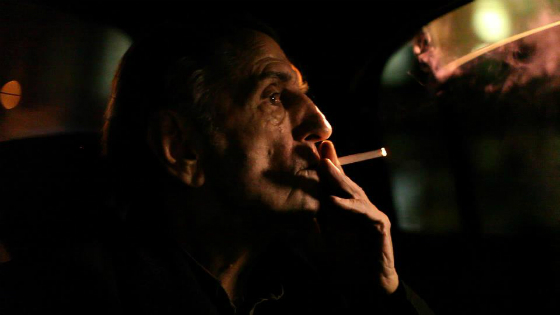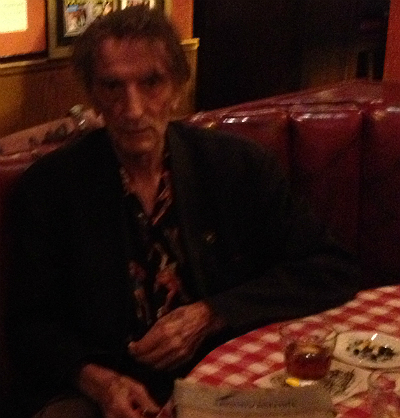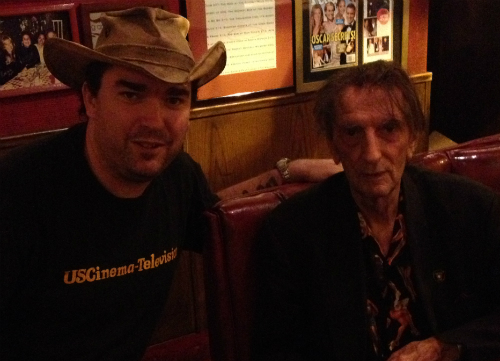TR Interview: Harry Dean Stanton
 |
Most celebrity interviews for upcoming movies are fairly easy, so long as you don’t act like an ass. They know they’re there to promote the work, and if you facilitate that to some degree, they’ll say something quotable.
But there are exceptions. Not everybody likes to talk. And in the past when that has happened, it usually has felt like someone just trying to mess with me (Rob Zombie) or a performance artist doing their shtick (wrestler “White Trash” Johnny Webb, comedian Chuck Sklar).
Harry Dean Stanton is another story. He is what you see so often onscreen – a man of few words (in his most acclaimed movie, Paris, Texas, he’s silent for around a half-hour). There’s no mean-spiritedness or pranking to it – he’s a friendly, gracious person who simply prefers not to be introspective. Harry Dean Stanton: Partly Fiction, Sophie Huber’s new documentary about the iconic costar of such films as Alien, Red Dawn and The Avengers tries to get to the heart of the man, and ends up finding it through his music.
I ask you to imagine the following interview as a scene from a movie, because it certainly felt like one…
INT. ITALIAN RESTAURANT. DAY.
It’s noon, but you’d never know it inside this windowless, high-end, Old Hollywood joint on Santa Monica Boulevard. At night, this place will be packed by the A-listers who can easily afford $60 lamb chops for every meal, and the Z-lister who want to keep up appearances and pretend they do.
For now, though, it’s closed, and this whole side of it is empty save for one man sitting at a booth, nursing his tenth cigarette – which is illegal indoors but nobody is going to tell HIM that – and sipping on a Manhattan (it’s five o’clock somewhere). He’s in his eighties, and the vices don’t seem to have hurt much, though he is hard of hearing.
It’s HARRY DEAN STANTON, the guy you’ve seen in a hundred movies or more.
 |
In walks LUKE, some dumbass in a Zombieland hat. He’s in awe, realizing there is probably nothing that can be asked here that the man hasn’t heard before, especially since he just did a 30-minute conversation for a radio show. Luke sits down and they shake hands. And the conversation (with only minor edits) begins…
Harry Dean Stanton: Now what is this for?
Luke Y. Thompson: This is for ToplessRobot.com.
HDS: ToplessRobot? What’s that?
LYT: It’s a website for nerds, from the Village Voice folks.
HDS: Yeah, I’m not familiar with the website.
LYT: [laughs]That’s OK. Probably a lot of my readers would know you best from The Avengers.
HDS: From what?
LYT: From The Avengers.
HDS: Yeah.
LYT: First of all, I just want to say thank you for your body of work, which has been such an inspiration – such a great thing to watch over the years. You’ve done so many really great movies. One of the movies that my generation loves the most is Red Dawn, which has less acclaim, but the one scene where you say “Avenge me, boys…”
HDS: Yeah.
LYT: It’s classic. It’s seared into our minds. When you did that, did you know that that was going to be the classic scene?
HDS: No, you never know. I never – as an actor, I never think about…I can tell what is going good or not, you know. But you never know.
LYT: Did you have sense of how big as stars those two boys were going to be back then?
HDS: How what?
LYT: How big Patrick Swayze and Charlie Sheen were going to be back then?
HDS: Kelly who?
LYT: Patrick Swayze and Charlie Sheen?
HDS: Oh, Charlie Sheen.
LYT: Did you have the sense that they had the potential to be…
HDS: I wasn’t thinking along those lines. It didn’t cross my mind.
LYT: Is this the first time someone has wanted to do a documentary about you?
HDS: No, there’s a guy in Kentucky who did one…god, Tom Thurman. He did one. But this is the one that’s been most comprehensive.
LYT: What’s it like to see someone else try to analyze you? It seems like you’re more of an instinctive kind of guy.
HDS: Everything just happens. There’s really no answer to any of this. It’s all a movie, even as we speak. And nobody knows the ending. [chuckles]
LYT: How did you meet Sophie the first time?
HDS: I met her here, as a matter of fact, in a booth across the…the other side of the bar. She was with her…I think she was with some guy she was going out with. That’s when I first met her. Yeah.
LYT: And how long was it before she proposed doing the movie?
HDS: Oh, it was two or three years ago.
LYT: Did you agree to it right away or was it something that took some convincing?
HDS: I wasn’t crazy about – I’m tired of being famous. [chuckles]Movies and all – I still do it, but it’s not important anymore.
LYT: I saw a quote from you online where you said that you could have taken opportunities that would have made you more famous, but they would have been a lot more work.
HDS: Oh, yeah. And if I fall into the suffering syndrome of regret, I question that. John Carpenter offered me my own series, and they presented it to me with this actual dialog: He said, “You will be more famous” – it was playing the part of a private investigator in a series with the Mary Tyler Moore people, totally solid organization – he said, “I’ll write the first three, later on you can help with the casting, the writing, the directing, whatever.” In other words, they were offering me a whole career of being a leading man. [chuckles]And, uh, they said “You’ll be more famous, more money than you’ve ever had, and more pussy than you’ll ever get, onscreen or off.” [chuckles]Those were the words they used.
LYT: And you turned them down?
HDS: I turned them down. I could have been a leading man right now, today. [laughs]But I did play the lead in Paris, Texas.
LYT: And that’s a movie everyone loves.
HDS: It’s my favorite movie.
LYT: Yeah, it’s a great one! You’ve done so many great movies, and you play great music. It seems like you worked plenty hard enough.
HDS: So, that’s what it is.
LYT: Yeah. One thing that really strikes me in the movie is the contrast between when you’re singing and when you’re acting, because you’ve played so many characters who don’t really lay their cards all on the table right away, but when you sing, all those emotions are laid out there right away. Is it a very different process?
HDS: No, it’s very similar, acting and singing. Any singer can be an actor. As a matter of fact, anybody can be a film actor! You, anybody in this – anybody, anywhere, can be a film actor, if you’ve got a good director.
LYT: But you’ve managed it, obviously with great directors, and with less-great directors. I subscribe to the Roger Ebert rule that any movie that you’re in can’t be altogether terrible.
HDS: No, I’ve been very fortunate in that way.
LYT: Is there any director that you haven’t worked with that you want to? You’ve done pretty much most of the greats.
HDS: No, I don’t think along those lines.
LYT: I saw that you did a Huckleberry Finn movie in 1960 that Buster Keaton was in. Did you get to work with him?
HDS: Buster Keaton?
LYT: Yeah.
HDS: Was he in it?
LYT: He was.
HDS: I don’t remember that. I don’t remember Buster Keaton. Are you sure of that?
LYT: I’m as sure as what the credits tell me.
HDS: Eh.
LYT: It may have been just a cameo on a different day.
HDS: What was the name of it?
LYT: Huckleberry Finn.
HDS: Oh, yeah. God, I can’t…it’s such a long time ago. No, I can’t remember what happened in that film. Who else was in it? John Carradine?
LYT: I don’t remember [Yes, he was]. The lead actor was someone I’ve never heard of before, so I guess it was a child actor who didn’t go on.
HDS: What was the name of it again?
LYT: Huckleberry Finn.
HDS: Huckleberry Finn, yeah. God, I remember that. God, it’s so frustrating – I can’t remember things.
LYT: One of my favorite anecdotes, I don’t know if you remember this one, but it was about when you were doing Repo Man, and they wanted you to use a fake baseball bat, and you insisted on using a real one for the scene. Do you remember that?
HDS: Yeah, I got in an argument with Alex Cox, right?
LYT: Yeah.
HDS: Yeah. That was a big argument. [chuckles]
LYT: Were they worried you were going to hurt somebody?
HDS: What?
LYT: Were they worried you were going to hurt somebody?
HDS: Yeah, he was afraid I was going to hurt somebody. But I knew what I was doing. We clashed some – a lot of times. But he’s brilliant – brilliant writer and director. For the most part.
LYT: My dad took me to that movie when I was young – that was a trip.
HDS: Was it Repo Man?
LYT: Yeah.
HDS: Yeah, yeah. That was a brilliant satire. I did that and Paris, Texas in sequence, and they’re my two favorite movies.
LYT: Wow. That’s a hell of a double header!
HDS: Yeah.
LYT: How did you come to be in The Avengers?
HDS: I can’t remember now. My agent called me. I’m still pissed off about that. In the original movie, they cut part of the scene out there.
LYT: Oh yeah?
HDS: It was the best scene in the movie. Still pissed off. [chuckles]
LYT: I believe it.
HDS: But they put it in the Blue version – Blue what?
LYT: Blu-ray.
HDS: Yeah. Yeah, they put it back in. And even though they cut it down, it still scored. I’m amazed.
LYT: So you said earlier you were kind of tired of being famous, but yet you probably still have all of these big movies and guys like Joss Whedon calling you up, wanting you to be in their movies. How do you…
HDS: Who?
LYT: Joss Whedon, The Avengers director.
HDS: Yeah.
LYT: All these people still want you. Do you find yourself in a place where you’re turning down roles now, because people want you too much?
HDS: Sometimes, yeah. Occasionally. I can’t remember the instances.
LYT: Philosophical question here, but I guess everybody asks this at some point or another: As someone who has lived a life that I think some people would be extremely proud of, is there a secret to living a long, productive life, as far as you can tell, or is it just happenstance?
HDS: I have no answer to that. There’s only the moment. Right here, right now, as we speak.
LYT: Well, that might be the answer – to live in the moment.
HDS: If there’s an answer, that’s it. [chuckles]Fall in love, intimately in love, with the gift of presence. With what “is”. Here, right here, right now. The seeds of everything you’ve ever longed for. It’s simple, and ordinary, and magnificent. See you all the way home. Tony Parsons. [chuckles]
Harry sees a waiter walking in the dark background.
HDS: Hey, who’s that? [calling out]Who is it?
[speaker]: You forgot my name, huh?
HDS: Yeah, who is it?
[speaker]: Giovanni Pizzochiare.
HDS: Huh?
[speaker]: Giovanni Pizzochiare. Nino – your friend, Nino.
HDS: Nino, I haven’t seen you in a long time.
Nino: I know, because you don’t come here when I’m here. How have you been? How you doing?
HDS: I don’t know.
Nino: All right. How’s the Manhattan?
HDS: Good.
They shake hands, as Nino realizes everything is being recorded. He makes his exit.
LYT: Popular guy!
HDS: Yeah.
LYT: Are there any career goals left for you, or have you achieved pretty much everything?
HDS: Any what?
LYT: Do you have any career goals left, anything to still…?
HDS: I have no goals.
LYT: Have you ever desired to put the acting and music together, maybe do musicals, or are those things you like to keep secret?
HDS: No, I have nothing to do with it. Just whatever happens, happens.
LYT: Has that always been your philosophy?
HDS: For a long time, yeah. Long time.
LYT: Do you remember what it was like doing Alien?
HDS: Oh, yeah.
LYT: The story goes, and I never know if this is a true story or not, that when they did the scene where it bursts out of John Hurt, that they didn’t tell you guys what was going to happen. Was that true – they didn’t tell you?
HDS: Yeah, that was – that was – actually that was traumatic. Blood running all over everybody…it was – it was a trauma, in real life, as an actor – on screen or off.
LYT: So was it pretty much one take, just to capture that reaction, and then on?
HDS: Yeah, one or two, I can’t remember.
LYT: Did you ever have a favorite kind of movie to make? You seemed to have an affinity for Westerns early on, or was that just coincidence – that’s what you happened to be cast in?
HDS: I can’t hear you.
LYT: Was there a genre or type of movie that you liked better? Certainly you were in a lot of Westerns to start with. Was that because they were your favorite, or just because it happened?
HDS: It doesn’t matter about the genre. It’s the writing, the director, the actors, if they’re all – if they’re all talented, it doesn’t matter.
LYT: What was it like living with Jack Nicholson, back in the day?
HDS: That was fun. We were close friends – forever. [chuckles]
LYT: He seemed pretty wild back then.
HDS: Yeah…yeah…yeah – he did Easy Rider, right? That’s what got him started.
LYT: Yeah, although Little Shop of Horrors – he’s wonderful in that too.
HDS: Yeah, he’s good.
LYT: Is he retired now? Did he say he wasn’t doing any more?
HDS: I don’t know.
LYT: What do you have coming up next? Are you working on any movies right now?
HDS: No, I’m just dealing with this documentary right now.
LYT: Is it hard talking about yourself so much?
HDS: Yeah, it’s tiresome after a while.
LYT: Yeah.
HDS: It’s taxing, because you do it so much.
LYT: Yeah.
HDS: I’ve done it, and for so many years.
LYT: When you do interviews and you’ve got people asking you about all of this old stuff, has it ever made you look back on things in a different way?
HDS: I don’t know. I can’t answer that. This is what it is. Right here, right now.
LYT: With that in mind, would you give any up-and-coming actors any advice?
HDS: Yeah – play yourself.
LYT: Play yourself.
HDS: Yeah. [chuckles]
LYT: Sometimes that’s a hard thing to do, to just play yourself in front of the camera…
HDS: Who else are you going to be except yourself? No matter what you’re doing, you’re still yourself, whatever that means. [chuckles]
As a publicist indicates the time is up, Luke is offered a picture with Harry, something that would generally be woefully uncool for him to actually ask for at a press day.
He does not turn it down.
 |
Harry Dean Stanton: Partly Fiction opens in limited release this weekend.
